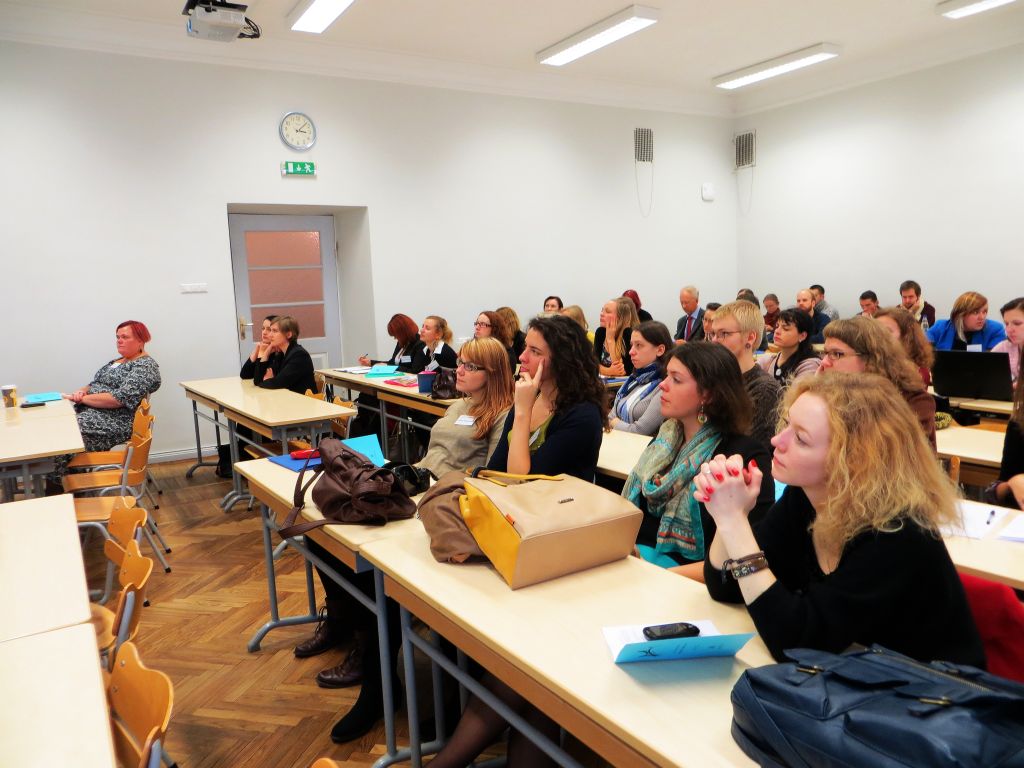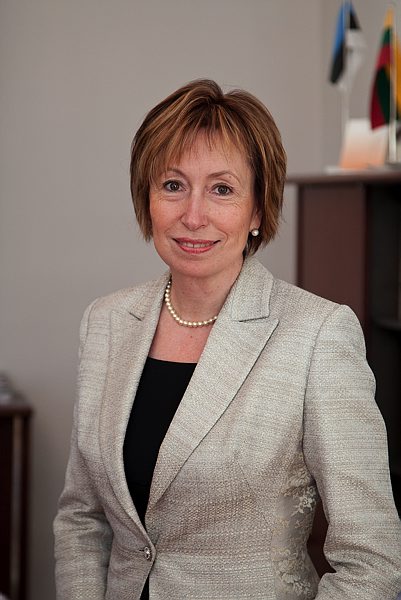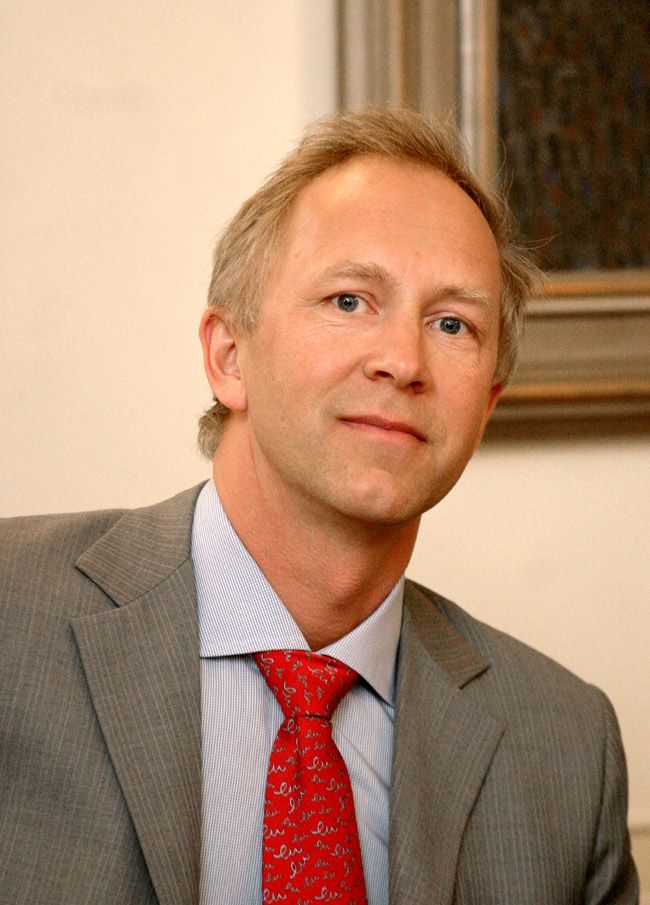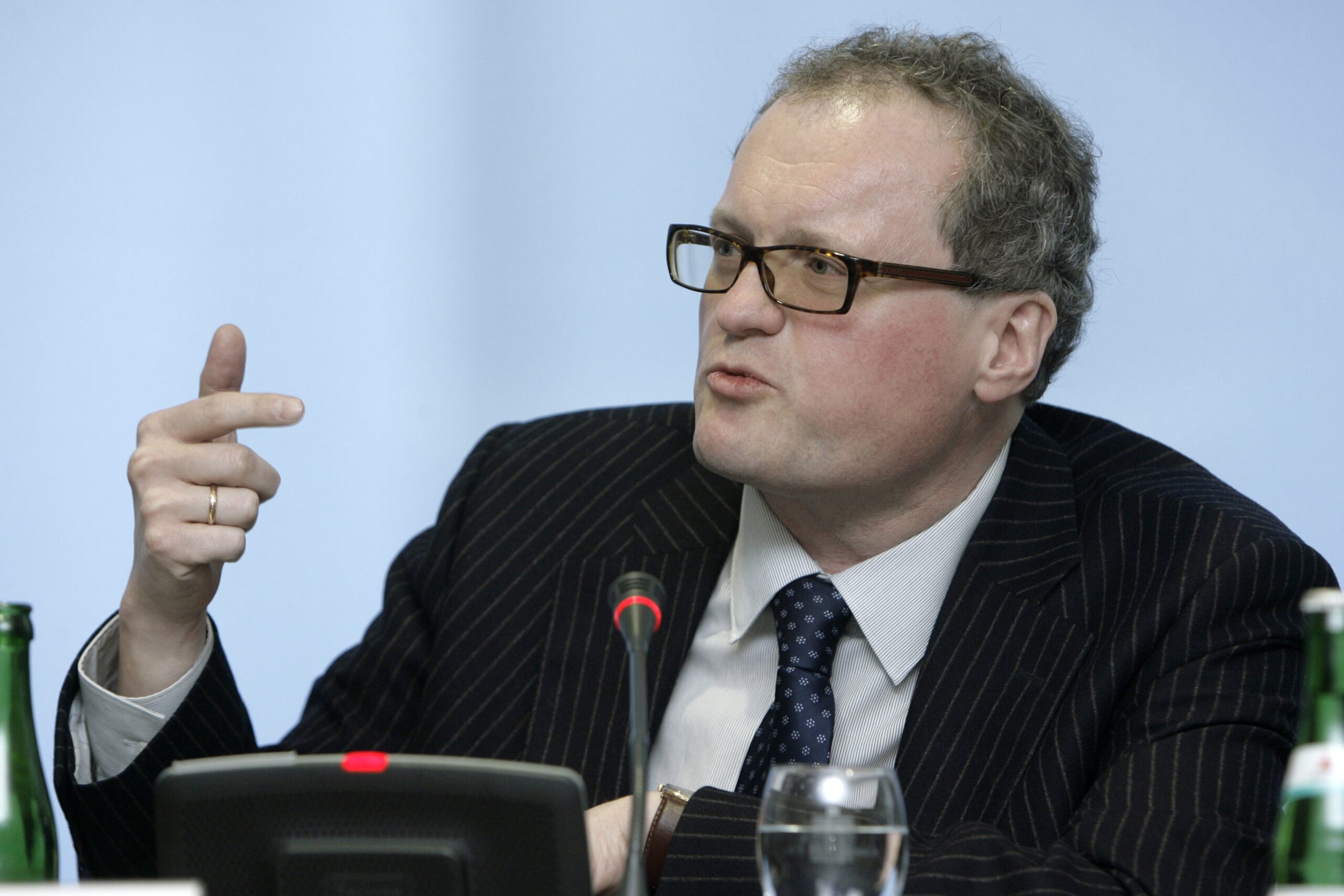BALTIC STUDENT CONFERENCE BRIDGES IN THE BALTICS
Tartu 2013
 1st Baltic Student Conference “Bridges in the Baltics” was held at the University of Tartu (Tartu, Estonia) on 27–28 September 2013.
1st Baltic Student Conference “Bridges in the Baltics” was held at the University of Tartu (Tartu, Estonia) on 27–28 September 2013.
The conference was organized by Language Centre of the University of Tartu together with the Latvian Language Agency and Lithuanian Ministry of Education and Research, celebrating the European Language day and Lithuania holding the Presidency of the Council of the European Union.
Presentations were given by 51 students from 8 countries (Estonia, Latvia, Lithuania, Poland, Finland, UK, Germany, Czech Republic)
- PROGRAMME, PARALLEL SESSIONS AND ABSTRACTS
- PHOTOS
- REVIEW by Ilze Boldāne (in Latvian)
Baltic poetry and folklore evening was an event organized by the University of Tartu Language Centre and the Singer-Songwriter Festival “Mailaul”. It was an event that gave a glance at the latest in Baltic poetry (presented by young poets from Estonia, Latvia and Lithuania) and Baltic folk music (performed by young musicians from Viljandi, Rīga and Kaunas). Poetry translator Jayde Will.
Performances schedule:
Where: Genialistide Klubi (Magasini 5, Tartu, behind Lai 37)
Free of charge for the participants of the First Baltic Student Conference “Bridges in the Baltics”. For others 3/4 €
21.00-21.30 Estonian poetry: Maarja Pärtna (EST), Helena Läks (EST)
21.30-22.00 Latvian Poetry: Ulvis Zirnis (LV), Andris Hiršs (LV)
22.00-22.30 Lithuanian Poetry: Ramunė Brundzaitė (LT), Jonas Martinaitis (LT)
22.30-23.30 Tai Tai (LV)
23.30-00.30 Lipk ant sienų (LT)
00.30-… Midrid (EST)
PLENARY SPEAKERS
 Prof. Birute Klaas-Lang (PhD) is the Professor of Estonian as a foreign language at the University of Tartu and 2012-2014 works as visiting Professor of Estonian language and culture at the University of Helsinki. Her expertise lies in contact linguistics, language typology and sociolinguistics. She is an applied linguist highly experienced in language policy and planning. As the head of the Estonian Language Board, she has been responsible for drafting, negotiating, publishing/disseminating and monitoring the “Estonian Language Development Plan 2010-17”.
Prof. Birute Klaas-Lang (PhD) is the Professor of Estonian as a foreign language at the University of Tartu and 2012-2014 works as visiting Professor of Estonian language and culture at the University of Helsinki. Her expertise lies in contact linguistics, language typology and sociolinguistics. She is an applied linguist highly experienced in language policy and planning. As the head of the Estonian Language Board, she has been responsible for drafting, negotiating, publishing/disseminating and monitoring the “Estonian Language Development Plan 2010-17”.
Abstract: Language policy, linguistic landscapes and sustainability of semi-small-sized national languages
The linguistic and cultural diversity of the study and work environment has become of the part of contemporary life; openness and tolerance to foreign languages and cultures are the pillars of academic and economic culture. Linguistic diversity in Estonia is obvious: in 2011 there were 157 mother tongues spoken in Estonia. In these new global challenges the main strategic goal is to achieve a balance between the maintenance of the national language (Estonian) in all domains of language use, and to develop multilingualism on workplaces, in institutions of higher education, on personal level and to rise language capacities of the Estonian residents/competitiveness of the country.
There is an urgent need for research made in the broader language environment (cf. linguistic culture and language policy and planning), since the focus has so far been on (changes in) language as a grammatical system (ELDP).
The presentation follows the ethnographic trend in language policy, which was described, for example, by David Cassels Johnson in his article ‘Ethnography of language policy (in Language Policy 2009: 8: 139–159: “The ethnography of language policy is a method for linking micro-level educational practices with macro-level language policies and discourse. This method is grounded in the philosophy that critical analyses of language policy texts should be combined with empirical data collection on policy interpretation and appropriation in some local educational context.”
I will provide an overview of the national regulations and strategic documents in Estonia, Latvia, and Lithuania, which deal with the position of the state languages with regard to higher education and science. The section on institutional regulations will focus on the language-policy legal space in the leading universities of the three countries (the University of Vilnius, the University of Latvia, and the University of Tartu). Also, the available statistics about the three countries and the universities will be provided. The presentation focuses on the macro level (national regulations of language policy) and the meso level (institutional language policy) of language policy. The micro level or the grassroots level calls for special research, but references to the prestige and status of a language in society will provide an assemblage of micro level attitudes. Also, personal choices in language preferences in higher education (e.g. the choice of the language of one’s PhD dissertation) give some idea whether the national and institutional language-policy regulations and strategies will lead to the desired result.
Literature: ELDP= Estonian Language Development Plan (2011–2017): http://ekn.hm.ee/system/files/Eesti+keele+arengukava+inglise.indd_.pdf Johnson, D.C (2009). Ethnography of language policy. – Language Policy 2009: 8, 139–159.
 Andrejs Veisbergs (b. 1960), Dr. Habil. Philol. is a Professor of University of Latvia. His research publications since 1985 amount to more than 300, mainly on Idioms, Borrowing, Latvian, Language Contacts, Translation and Interpreting and Lexicography. He is the author of the biggest Latvian-English Dictionary (1997, Second edition 2005) as well as the author on several monographs on Latvian Idioms, Contrastive Linguistics, Conference Interpreting (2007, 2009), Idiom Borrowing (2012). Since 2004 he is also the Chairman of the Presidential Latvian Language Commission as well as occupies many other positions within Latvian language and academic community and on many editorial boards. Corresponding Member of the Latvian Academy of Sciences, member of EURALEX, consultant of Oxford English Dictionaries. E-mail: anveis@lanet.lv
Andrejs Veisbergs (b. 1960), Dr. Habil. Philol. is a Professor of University of Latvia. His research publications since 1985 amount to more than 300, mainly on Idioms, Borrowing, Latvian, Language Contacts, Translation and Interpreting and Lexicography. He is the author of the biggest Latvian-English Dictionary (1997, Second edition 2005) as well as the author on several monographs on Latvian Idioms, Contrastive Linguistics, Conference Interpreting (2007, 2009), Idiom Borrowing (2012). Since 2004 he is also the Chairman of the Presidential Latvian Language Commission as well as occupies many other positions within Latvian language and academic community and on many editorial boards. Corresponding Member of the Latvian Academy of Sciences, member of EURALEX, consultant of Oxford English Dictionaries. E-mail: anveis@lanet.lv
Abstract: The Role of Translations/Translators in Modernizing Identity (Baltic Languages, Literatures and Self-Expression)
Baltic national identities, which are language-centered, their literary polysystems and even written languages as such are to a large extent the result of translations. Translations have constituted majority of literary and other texts. Translation played an exceptionally important role in the beginnings of written languages in the 16th-18th centuries. Translators (usually non-native speakers) formed, codified and modified the written languages. Religious translations applied rigorous fidelity approach. Secular translations on the other hand tended to be localizations of easy-reading, sentimental German stories. End of the 18th and beginning of the 19th century sees numerous parallels in translations in Latvian, Lithuanian and Estonian, e.g. medical books, Genoveva story, Robinson Crusoe a.o. Parallel to the rise of native literature in the 19th century a gradual transition from adaptation /domestication to foreignization and fidelity as the main approach occurred. Quality translations by native speakers were important in energizing and elaborating, codifying and normalizing the “new” languages and identities. Distinguished Baltic authors were usually also prolific translators, usually first honing their skills and elaborating styles in the latter activity.
When national languages and writing stabilized, blending the written language and the spoken parlance, more ambitious translations of Western classics started, usually done by distinguished writers. After acquiring independence at the beginning of the 20th century the volume of translation grew and included also literature from more exotic sources as well as literature of the Baltic neighbours . Despite the huge rise of national literature, translations nevertheless remained in the centre of literary polysystems. The soviet period brought a re-orientation – most of the translations, including part of fiction, were done from Russian or via Russian. Translation scene was Moscow-controlled, most of translations consisted of soviet literature and classics conforming to language norms and standards as well as the rigorous straightjacket of soviet ideology. Meanwhile the postmodern native literature scene often found inspiration in older translations, covert and arcane references to historical events and parallels. Regaining of independence brought an enormous growth in the volume of translated information and a major shift from expressive (fiction) texts to appellative and informative texts occurred. Within 5 years English became the dominant source language. Translation again became the main vehicle of language development. In a somewhat paradoxical way translators have formed, altered and inspired a strong language bound national identity. Their voice, though not always obvious and recognized, has been central in the Latvian, Estonian and Lithuanian narrative polyphony.
 Dr. Leonidas Donskis, (Lithuania), elected to the European Parliament in 2009, has a background as an academic with PhDs from the Department of Philosophy in Vilnius (1990) and another from the Department of Social and Moral Philosophy of the University of Helsinki (1999). He also received an honorary Doctorate from the University of Bradford in 2010. He was Professor and Dean at the Vytautas Magnus University School of Political Science and Diplomacy, in Kaunas, Lithuania before being elected to the European Parliament. He is also a visiting professor in several universities, including Bologna, Helsinki, and Tallinn. Leonidas was author and host of the highly popular cultural programme “Be pykčio” (“Pique-free”) on the Lithuanian national television LTV (2003-2009). As an academic Donskis has written and edited over thirty books, half of them in English, combining political theory, history of ideas, philosophy of culture, and philosophy of literature. His books are translated in 15 languages. Among his well known works are: Modernity in Crisis: A Dialogue on the Culture of Belonging (2011), Power and Imagination: Studies in Politics and Literature (2008), and Forms of Hatred: Troubled Imagination in Modern Philosophy and Literature (2003). Most recently, he has co-authored a book with the eminent sociologist Dr. Zygmunt Bauman Moral Blindness: The Loss of Sensitivity in Liquid Modernity (2013).
Dr. Leonidas Donskis, (Lithuania), elected to the European Parliament in 2009, has a background as an academic with PhDs from the Department of Philosophy in Vilnius (1990) and another from the Department of Social and Moral Philosophy of the University of Helsinki (1999). He also received an honorary Doctorate from the University of Bradford in 2010. He was Professor and Dean at the Vytautas Magnus University School of Political Science and Diplomacy, in Kaunas, Lithuania before being elected to the European Parliament. He is also a visiting professor in several universities, including Bologna, Helsinki, and Tallinn. Leonidas was author and host of the highly popular cultural programme “Be pykčio” (“Pique-free”) on the Lithuanian national television LTV (2003-2009). As an academic Donskis has written and edited over thirty books, half of them in English, combining political theory, history of ideas, philosophy of culture, and philosophy of literature. His books are translated in 15 languages. Among his well known works are: Modernity in Crisis: A Dialogue on the Culture of Belonging (2011), Power and Imagination: Studies in Politics and Literature (2008), and Forms of Hatred: Troubled Imagination in Modern Philosophy and Literature (2003). Most recently, he has co-authored a book with the eminent sociologist Dr. Zygmunt Bauman Moral Blindness: The Loss of Sensitivity in Liquid Modernity (2013).
Abstract:Sometimes Less Means More, or Why Do Baltic Studies Matter?
What will the Baltic Region be like in the 21st century? What will be the common denominator between Klaipeda, Riga, Tallinn, Kaliningrad, and St. Petersburg in the new epoch? Will the Baltic States come closer to the Nordic states, or will they remain a border region in which contrasting Eastern and Western European conceptions of politics and public life continue to fight it out amongst themselves?
Will we able to apply to the Baltic countries that description by which Milan Kundera attempted to identify Central European countries: a huge variety of culture and thought in a small area? Will the tie that binds us to our neighbors be just a remembrance of common enslavement and a sense of insecurity, or will we create a new Baltic regional identity, one that is both global and open and in which we can map our past and our present according to altogether different criteria?
These are some of the questions the Baltic Region raises: formulating them is no less useful and meaningful than answering them. Possibly here is where some vital experiences are tried out, experiences that larger, more influential countries have not yet had but which await them in the future. It may be that the Baltics were and still remain a laboratory where the great challenges and tensions of modernity can be tested and the scenarios for European life in the not-too-distant future take shape. Hence, the crucial importance of Baltic studies.
Does it make sense to refer to the social and political existence of the Baltic countries as to being between civilizations of East and West, or as being on the boundary of two worlds? What are the most characteristic features of modern moral imagination? How does it manifest itself in the politics and cultures of the Baltic countries? These will be the main foci of my talk intended as a commentary on the strategy of Baltic studies, itself a critical examination of identity, politics and culture in the Baltic countries.


